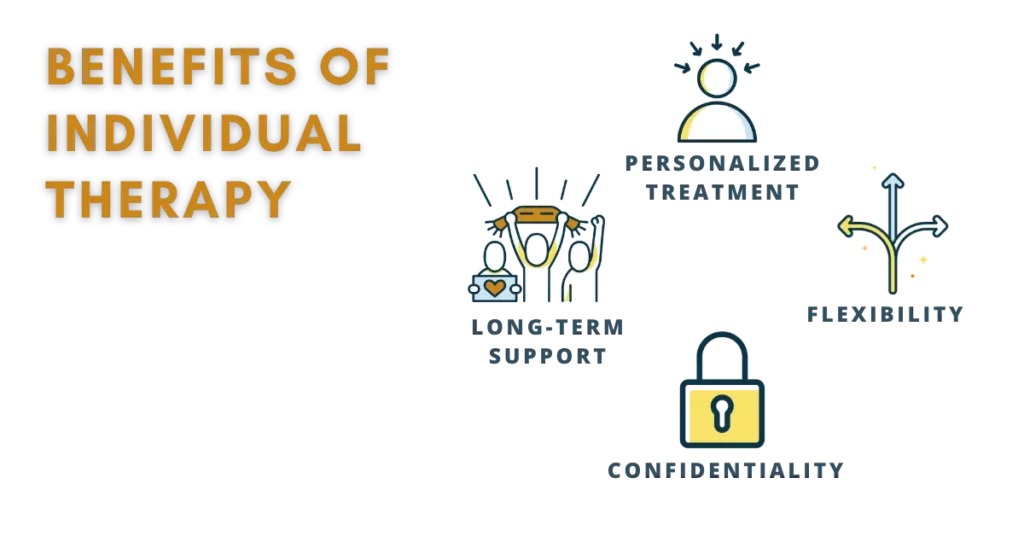Addiction is a complex condition that affects individuals physically, emotionally, and mentally. Addiction recovery requires a multifaceted approach that addresses each aspect of addiction. One crucial component of addiction recovery is individual therapy.
In this article, we will explore the role of individual therapy in addiction recovery, the benefits of individual therapy, and how Asheville Recovery Center can help you recover.
Understanding Individual Therapy
Individual therapy is a form of psychotherapy that involves a one-on-one therapy session between a therapist and a client. Individual therapy aims to help clients explore their thoughts, emotions, and behaviors to understand themselves and their addiction better. Individual therapy provides clients with a sense of accountability, helping those in early recovery to prevent relapse. Individual therapy can be conducted in various settings, including outpatient clinics, inpatient treatment centers, and private practice.

The Role of Individual Therapy in Addiction Recovery
Individual therapy is a crucial component of addiction treatment, providing a safe and confidential space for individuals to explore their addiction. Addiction is a complex and multifaceted disease that can significantly impact a person’s mental, emotional, and physical well-being. Individual therapy allows individuals to work with a trained therapist to identify the root causes of their addiction, develop coping skills to manage cravings and triggers and learn new skills to prevent relapse. Here are some of the ways individual therapy can help individuals in addiction recovery:
Addressing Underlying Issues
Addiction is often rooted in underlying issues such as trauma, anxiety, depression, or stress. Individual therapy can help individuals identify and address these underlying issues to reduce the risk of relapse.
Developing Coping Mechanisms
Addiction recovery requires individuals to develop healthy coping mechanisms for cravings, triggers, and stressors. Individual therapy can help individuals learn and develop coping skills to prevent relapse and aid in their recovery process.
Enhancing Self Awareness
Addiction can disconnect individuals from their thoughts, emotions, and behaviors. Individual therapy can help individuals increase self-awareness to understand themselves better and learn how to manage their addiction correctly.
Encouraging Accountability
Individual therapy provides a safe space for individuals to be held accountable for their actions and decisions by their therapist. This accountability can help individuals stay motivated and committed to their recovery.
Strengthening Support Systems
Addiction recovery requires family, friends, and peer support. Individual therapy can help individuals strengthen their support systems by developing healthy relationships and communication skills.

The Benefits of Individual Therapy
Individual therapy has many benefits in helping those in the recovery process who may not want to attend group therapy sessions or support groups. By providing a safe, supportive, and individualized environment to explore the underlying causes of addiction, individual therapy can help individuals achieve long-term sobriety and improve their overall quality of life. Some of the benefits include:
Personalized Treatment
Individual therapy provides a personalized treatment tailored to an individual’s needs and goals. This allows the therapist to give each client a comprehensive and intensive treatment plan for their specific needs.
Confidentiality
Individual therapy provides a safe and confidential space to explore their thoughts, emotions, and behaviors. Since individual treatment is conducted in a one-on-one session, many people feel more confident sharing their thoughts, leading to more effective therapy in addiction recovery.
Flexibility
Individual therapy can be conducted in various settings and adapted to an individual’s schedule. While in a group setting, the sessions may be inconvenient, or you may not receive enough time to discuss your treatment plan.
Long-term Support
Individual therapy can provide long-term support for individuals in addiction recovery, even after they leave the treatment centers. The personalized treatment allows the therapist and client to create a long-term treatment plan and continue their sessions, while other treatment options may not allow for this.
How Individual Therapy Can Help Prevent Relapse
Individual therapy can be an effective tool in preventing relapse during addiction recovery. Individual therapy helps individuals build skills critical for long-term sobriety, such as identifying triggers, developing coping skills, and creating relapse prevention strategies. These skills can help individuals develop the tools they need to manage the challenges of everyday life without resorting to substance abuse. Here are some ways individual therapy can help individuals prevent relapse:
Identifying Triggers
Individual therapy can help individuals identify triggers that may lead to relapse. By understanding their triggers, individuals can develop strategies to avoid or cope with them when they arise.
Learning Coping Skills
Individual therapy can help individuals learn healthy coping skills to manage stress and difficult emotions. Coping skills can include mindfulness practices, breathing techniques, and positive self-talk.
Developing Relapse Prevention Strategies
Individual therapy can help individuals develop a personalized relapse prevention plan that outlines specific steps to take if they are at risk of relapse.
Addressing Co-Occurring Mental Health Conditions
Many individuals with addiction also struggle with co-occurring mental health conditions. Individual therapy can help individuals address these conditions and develop strategies to manage them, reducing the risk of relapse.
By incorporating individual therapy into addiction recovery, individuals can develop the skills, strategies, and support they need to prevent relapse and achieve lasting recovery.
Combining Individual Therapy with Other Treatment Options
Individual therapy is a powerful tool in addiction recovery, but it is even more effective when combined with other treatment modalities. Here are some ways that combining individual therapy with other treatment options can lead to optimal addiction recovery outcomes:
Group Therapy
Group therapy can complement individual therapy by providing individuals with the opportunity to connect with others who are going through similar experiences. Group therapy can help individuals develop a sense of community and support, which can be crucial in addiction recovery. Some individuals may start with individual therapy and then move into group therapy after discussing it with their therapist.
Cognitive Behavioral Therapy
Cognitive behavioral therapy (CBT) can be used with individual therapy to help individuals identify negative thought patterns and replace them with positive ones. CBT can be an effective tool in reducing the risk of relapse and improving mental health conditions.
Combining individual therapy with other treatment options can lead to optimal addiction recovery outcomes and prevent relapse. By addressing the complex aspects of addiction through a multifaceted approach, individuals can develop the skills, strategies, and support they need to achieve lasting recovery.

Contact Asheville Recovery Center for Individual Therapy Options
Individual therapy plays a crucial role in addiction recovery. It helps individuals address underlying issues, develop coping mechanisms, enhance self-awareness, encourage accountability, and strengthen support systems.
Asheville Recovery Center is a leading addiction treatment center that provides individual therapy as part of its addiction treatment program. Asheville Recovery Center recognizes the importance of individual therapy in addiction recovery and provides personalized therapy sessions for each client. The treatment center also offers various other services, including group therapy, family therapy, and aftercare support. Call Asheville Recovery Center today to discuss your treatment options if you or a loved one is struggling with addiction recovery.






